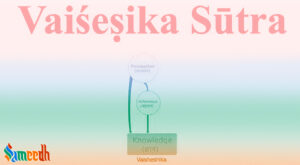The Vaisheshika Sutras, attributed to the sage Kanada, are foundational texts of the Vaisheshika school of Indian philosophy. These sutras provide a systematic exposition of Vaisheshika philosophy, focusing primarily on metaphysics, ontology, and the classification of the universe.

The Vaisheshika Sutras are traditionally attributed to the ancient sage Kanada, also known as Kashyapa or Ulūka. Kanada is believed to have lived around the 2nd century BCE. The Vaisheshika Sutras analyze the nature of reality and classify the universe into distinct categories known as padārthas. These categories include substances (dravy), qualities (guṇa), actions (karma), universals (sāmānya), particularities (viśeṣa), and inherence (samavāya). Kanada elaborates on each of these categories and their characteristics.
The Vaisheshika Sutras expound on the doctrine of causality (kārya-kāraṇa-vāda), which asserts that every effect has a cause. Kanada discusses different types of causation, including material cause (upādāna-kāraṇa), instrumental cause (nimitta-kāraṇa), and substantive cause (sāmavāya-kāraṇa).
While the primary focus of the Vaisheshika Sutras is on metaphysics and ontology, the text also touches upon ethical principles and the concept of liberation (moksh). Kanada discusses the importance of ethical conduct and the pursuit of knowledge as means to attain liberation from the cycle of birth and death (saṃsar).
Here’s a summary of the key teachings found in the Vaisheshika Sutras:
- Padārthas (Categories of Existence):
- The Vaisheshika Sutras classify the universe into distinct categories known as padārthas. These categories include:
- Dravya (Substance): Fundamental entities that exist independently, such as earth, water, fire, air, ether, time, space, self, and mind.
- Guṇa (Quality): Attributes or qualities that characterize substances, such as color, taste, smell, touch, and sound.
- Karm (Action): The capacity of substances to undergo change or transformation.
- Sāmānya (Generality): Universal or common properties shared by multiple substances.
- Viśeṣa (Particularity): Unique or individual characteristics that distinguish one substance from another.
- Samavāya (Inherence): The relationship of inherence between substances and their qualities.
- The Vaisheshika Sutras classify the universe into distinct categories known as padārthas. These categories include:
- Atomism:
- The Vaisheshika Sutras expound the theory of atomism, asserting that the universe is composed of imperceptible particles called atoms (paramāṇu). Atoms are eternal, indivisible, and indestructible entities that combine to form larger objects.
- Kanada discusses the properties of atoms, their size, shape, motion, and arrangement, as well as their role in the composition of matter.
- Causality:
- Kanada elaborates on the doctrine of causality, emphasizing that every effect has a cause. He distinguishes between different types of causes, including material cause (upādāna-kāraṇa), instrumental cause (nimitta-kāraṇa), and substantive cause (sāmavāya-kāraṇa).
- The Vaisheshika Sutras analyze the principles of causation and the relationship between cause and effect in the functioning of the universe.
- Epistemology:
- The Vaisheshika Sutras discuss epistemological issues, including the means of valid knowledge (pramāṇa). Kanada recognizes perception (pratyakṣ), inference (anumān), comparison (upamān), testimony (śabd), and postulation (arthāpatti) as sources of valid knowledge.
- Kanad provides guidelines for distinguishing between valid and invalid knowledge and emphasizes the importance of logical reasoning and empirical observation.
- Ethics and Liberation:
- While the primary focus of the Vaisheshika Sutras is on metaphysics and epistemology, the text also addresses ethical principles and the concept of liberation (moksh). Kanad underscores the importance of ethical conduct, righteousness, and the pursuit of knowledge as means to attain liberation from the cycle of birth and death (saṃsār).
Overall, the teachings of the Vaisheshika Sutras provide a comprehensive philosophical framework for understanding the nature of reality, the principles governing the universe, and the path to spiritual realization and liberation. Kanada’s insights continue to influence Indian philosophy, particularly in the realms of metaphysics, atomism, and causality.
The Vaisheshika Sutras provide a comprehensive framework for understanding the nature of reality and the principles governing the universe according to the Vaisheshika school. Kanad’s teachings have had a significant influence on Indian philosophy, particularly in the realms of metaphysics, atomism, and causality.